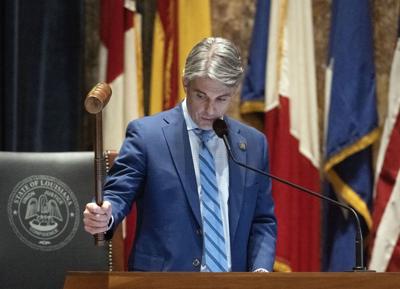As Gov. Jeff Landry and his allies move to quickly upend Louisiana government, there’s a question that often comes up in conversation among concerned legislative observers: What will Cameron do?
The Cameron in question is Senate President Cameron Henry, R-Metairie, a 16-year veteran of the Louisiana Legislature who may well be the most closely watched person in Baton Rouge, aside from the governor himself.
In a Capitol now led by an aggressive conservative administration and a legislative supermajority of the governor’s own party, Henry has emerged as pretty much the only obstacle on the road to rapid, massively disruptive change, some in the name of long-standing right-wing goals and some in pursuit of Landry’s personal political agenda.
In an interview, Henry rejected the characterization, but from the outside, it’s hard not to view him as kind of a Senator Speedbump.
Which is not to say that he’s nursing deep policy disagreements with the administration or the more compliant House.
Henry is a conservative Republican who once worked for Steve Scalise, the former Louisiana legislator who is now majority leader in the U.S. House. Back in 2016, Henry lost out on his bid to become House speaker because more moderate Republicans balked, choosing instead to support former Democrat Taylor Barras. In a strange twist, Barras is now commissioner of administration with the ultraconservative Landry administration, while Henry has become something of an opposition figure on select issues.
His independent streak first really showed itself in the special session on election issues, when the Senate diluted Landry’s quest to switch from open primaries to closed party primaries following what some described as shouting matches between the governor and Henry, who labeled it a “spirited” discussion.
In the current session, Henry and the Senate are taking a hard look at an expansive proposal that has already careened through the House to put public money toward private school tuition.
Henry supports the general concept of giving parents more choice, he said. But the Senate has its own bill, and he’s been studying how the runaway costs in states that have enacted so-called education scholarship accounts have busted budgets, mostly because the ESAs are being used by parents who already pay for private school.
He said senators want to understand the costs, and figure out how to prioritize should money not be available for all takers — a goal that really comes down to understanding more about how ESAs would work, and how many and which students would be eligible under what criteria.
“There are a lot of unanswered basic questions,” he said. “I think they got a little ahead of themselves on the bill.”
Henry has already put his stamp on the current session’s most potentially disruptive idea of all, to rewrite the state constitution in extremely short order. House author Beau Beaullieu, R-New Iberia — his college roommate as Henry frequently points out — changed the proposed timing so that a convention would end the session’s final day of June 3, not mid-July, after Henry made it clear that no senators would support staying in Baton Rouge any longer. The proposal now would require the new constitution to be approved by separate House and Senate majorities before going to voters. The original draft gave each lawmaker an equal vote, which, as Henry pointed out, would have allowed it to pass even if every senator opposed it.
Asked if the idea is now on track, he said this: “I don’t think it’s on track or off track. I still think members have a lot of unanswered questions.” They’re hardly alone on that.
Despite the focus on him, Henry said he’s really acting on concerns senators are conveying to him.
He chalked up the Senate’s slower pace and relative independence to the fact that the chamber is smaller than the House and has to work through fewer bills by fewer members. Another key factor, he said, is that unlike in House, there are almost no rookies in the Senate.
“Because of that, members are used to spending a little more time and are more comfortable questioning the administration,” he said.
The dynamic holds for the fledgling Landry administration as well, he said, noting that, “They’re new too, and their staff is new to this level of detail that’s required when dealing with this range of bills.”
“I get along with the governor. He moves really fast. Sometimes that’s great,” Henry said. But “sometimes you’ve got to slow down and read (bills) again.”
I think a lot of legislative insiders would say amen to that.

